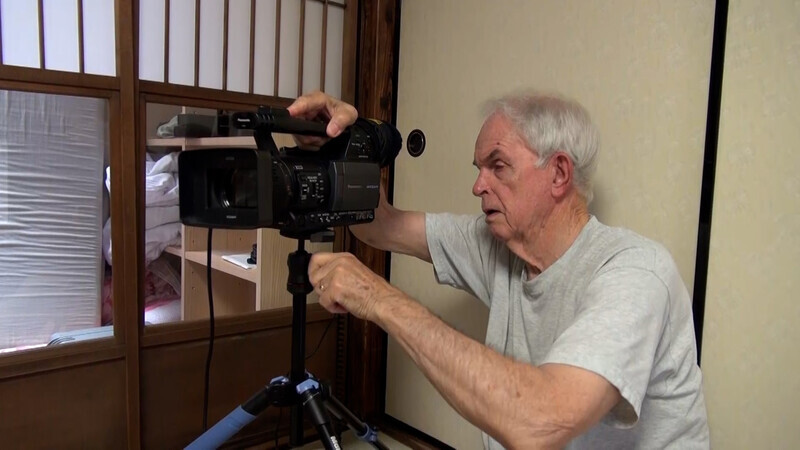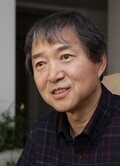hankyoreh
Links to other country sites 다른 나라 사이트 링크
[Column] My “cool” mentor


I was saddened to hear that my old mentor, professor David Plath, had fallen ill. He turned 91 this year.
When I first met him as my graduate advisor 40 years ago, when he was middle-aged, he looked like an academic version of Sean Connery. He was so cool that, in front of him, my not-so-fluent English became even more stilted.
At the time, I was working part-time in a grocery store while going to school. Sometimes, I had to run to his morning class with no time to wash the fish smell off my hands or shampoo my greasy hair, and would sometimes even doze off in class. Still, he would watch over me, offering encouragement from time to time. In retrospect, I wonder if I was ever as understanding a professor as him.
As an anthropologist studying Japan, he tried to eliminate the American prejudice against the Japanese that had existed since the Pacific War. For a short time, I misunderstood him to be a pro-Japanese scholar. However, he was the one who recommended me, a young Korean man, to a director position for our school’s Year-in-Japan Program for American students, to the surprise of many Japanese professors. My Japanese, to say nothing of my English, was still far from adequate. I think he wanted to send a message to Japanese society, which was clamoring for internationalization at the time, that their first step should be to overcome discrimination against Koreans.
Professor Plath pioneered the field of visual anthropology and produced a documentary about the eco-friendly work carried out by Japanese women divers. With his wife, professor Jacquetta Hill, he recorded the cultural changes of the Lahu people in Northern Thailand for 30 years. They used their retirement funds to create a scholarship foundation for the Lahu young people. With this scholarship, many young Lahu people were able to attend high school, with some even going on to study abroad and become professors in Thailand. I once asked Plath, who led a frugal life, if it wasn’t difficult for a tall man like him to take economy class in a trans-Pacific flight. He replied with a smile, “You just endure!”
When I told him about the project to repatriate the remains of the Korean victims of the forced labor excavated in Hokkaido, Japan, he decided to join the procession. In the summer of 2015, the 85-year-old anthropologist rushed to set up a documentary team on his own dime. To save money, he only accompanied a camerawoman and his grandson as an assistant, directing, editing, and subtitling the film all on his own.
The journey, “Homecoming in 70 Years,” traversed 3,000 kilometers from the sites of forced labor in Japan to Korea over a period of 10 days. He delivered a tribute at the funeral ceremony held at the Seoul Plaza. “I want Americans to see our images of people in East Asia carrying white boxes. I wish the whole world could see those images and learn from them. [. . .] Let’s imagine a day when all the people on this planet will do the right thing. [. . .] Doing the free labor of carrying, the free labor that can change boxes holding what was lost into shrines that transport all of human life. That day will be day one of lasting world peace, because finally, we all will be carrying one another.”
His documentary, “So Long Asleep” (2016), introduces the repatriation project as a pioneering example of an international grass-roots movement. The collaborative excavation of such historical victims opens the future of reconciliation and peace between perpetrators and victims. The documentary received a standing ovation at the premiere in the Midwest Conference on Asian Affairs, and was evaluated as an excellent resource for the global civic movement for the excavation and commemoration of the victims of imperialism.
He often made the crowd laugh by introducing his name in Japanese pronunciation, “I wish I could become a ‘purasu’ (plus) in your life.” When I retired last year, he welcomed my enlistment to the Emeritus Professors Corp of Doing Nothing but Somehow Still Busy. He even joked to his physician, saying, “If you’d just prescribe me four extra hours per day, all my symptoms would disappear.”
Just as I was feeling terrible for not being able to see him when he was ill, I was asked to give a lecture in Canada and I decided to visit him on the way. My mentor, exhausted and legs swollen, was wildly happy to see me but still maintained his cool demeanor. He handed me a poem by the farmer poet Wendell Berry.
“When the despair for the world grows in me / and I wake in the night at the least sound / in fear of what my life and my children’s lives may be, / I go and lie down where the wood drake / rests in his beauty on the water, and the great heron feeds. / I come into the peace of wild things / who do not tax their lives with forethought / of grief. I come into the presence of still water. / And I feel above me the day-blind stars / waiting for their light. For a time / I rest in the grace of the world, and am free.”
The student, now old enough to wake up in the middle of the night with worries, and the mentor, enduring the difficulties day by day, communed on our pain in the moment. My mentor not only taught me how to live gracefully but also showed me how to endure with dignity.
I stayed for a few days and served him his favorite Korean dishes. We called our convoys from the “Homecoming in 70 Years.” His complexion brightened. He said he has two more documentaries to edit. I recited to him my favorite poem by Robert Frost, “Woods are lovely dark and deep / But I have promises to keep / And miles to go before I sleep / And miles to go before I sleep.”
I said goodbye and left his house. He came out to see me off, lugging his heavy feet. My oh-so-cool mentor whispered to me, “I hate to see you leave.”
Please direct questions or comments to [english@hani.co.kr]

Editorial・opinion
![[Editorial] Intensifying US-China rivalry means Seoul must address uncertainty with Beijing sooner than later [Editorial] Intensifying US-China rivalry means Seoul must address uncertainty with Beijing sooner than later](https://flexible.img.hani.co.kr/flexible/normal/500/300/imgdb/original/2024/0517/8117159322045222.jpg) [Editorial] Intensifying US-China rivalry means Seoul must address uncertainty with Beijing sooner than later
[Editorial] Intensifying US-China rivalry means Seoul must address uncertainty with Beijing sooner than later![[Column] When ‘fairness’ means hate and violence [Column] When ‘fairness’ means hate and violence](https://flexible.img.hani.co.kr/flexible/normal/500/300/imgdb/original/2024/0516/7417158465908824.jpg) [Column] When ‘fairness’ means hate and violence
[Column] When ‘fairness’ means hate and violence- [Editorial] Yoon must stop abusing authority to shield himself from investigation
- [Column] US troop withdrawal from Korea could be the Acheson Line all over
- [Column] How to win back readers who’ve turned to YouTube for news
- [Column] Welcome to the president’s pity party
- [Editorial] Korea must respond firmly to Japan’s attempt to usurp Line
- [Editorial] Transfers of prosecutors investigating Korea’s first lady send chilling message
- [Column] Will Seoul’s ties with Moscow really recover on their own?
- [Column] Samsung’s ‘lost decade’ and Lee Jae-yong’s mismatched chopsticks
Most viewed articles
- 1[Editorial] Transfers of prosecutors investigating Korea’s first lady send chilling message
- 2[Column] US troop withdrawal from Korea could be the Acheson Line all over
- 3[Exclusive] Unearthed memo suggests Gwangju Uprising missing may have been cremated
- 4Xi, Putin ‘oppose acts of military intimidation’ against N. Korea by US in joint statement
- 5‘Shot, stabbed, piled on a truck’: Mystery of missing dead at Gwangju Prison
- 6[Column] When ‘fairness’ means hate and violence
- 7Spotlight turns to Hyundai Group Chairwoman’s visit to North Korea
- 8[Column] Samsung’s ‘lost decade’ and Lee Jae-yong’s mismatched chopsticks
- 9[Column] Will Seoul’s ties with Moscow really recover on their own?
- 10[Editorial] Intensifying US-China rivalry means Seoul must address uncertainty with Beijing sooner t